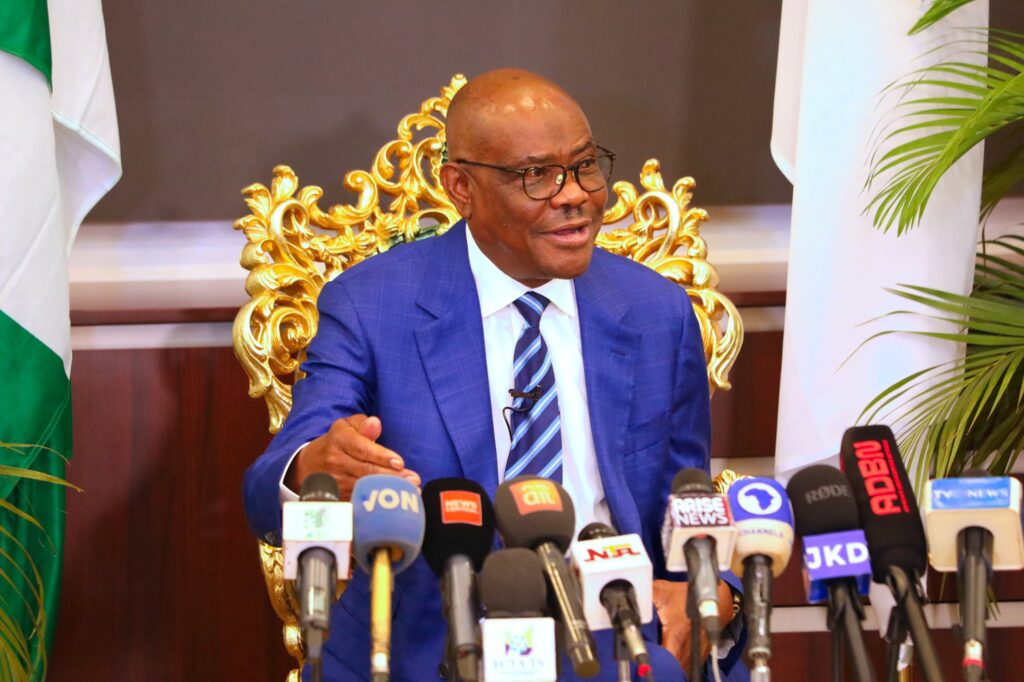Listen to the article
Nigerian Minister Rejects Claims of Anti-Christian Genocide, Calls Allegations Political Tactic
Federal Capital Territory (FCT) Minister Nyesom Wike has forcefully rejected allegations of coordinated genocide against Christians in Nigeria, describing such claims as false, exaggerated, and deliberately manufactured to create religious division across the country.
During a Monday appearance on Channels Television’s “Politics Today,” Wike suggested these allegations represent a calculated political strategy rather than legitimate concerns about religious persecution. He specifically linked the narrative to opposition parties preparing for the next electoral cycle.
“It is very obvious that the opposition today has seen that no party is prepared to challenge the President returning to power,” Wike stated during the broadcast interview. “What do we do? One of the things to do is bring up such a thing that will divide the country.”
The minister pointed to the composition of Nigeria’s current security leadership as evidence contradicting any systematic anti-Christian agenda. He highlighted that several top security officials, including the Inspector General of Police, the Director General of the Department of State Services, and the Chief of Defense Staff, are Christians themselves.
“The problem we have today is that no right-thinking person will think that we will sit in a government and support the killing of our own people,” Wike emphasized, suggesting that such allegations defy logical scrutiny.
The controversy has gained international attention in recent weeks, particularly following comments from several U.S. political figures who have accused Nigeria of religious persecution. These allegations have created diplomatic tension between Nigeria and the United States, with Nigerian officials expressing concern about potential damage to bilateral relations.
Security analysts note that Nigeria continues to battle multiple complex security challenges, including Boko Haram insurgency in the northeast, banditry across northwestern states, and farmer-herder conflicts in the Middle Belt region. While religious elements sometimes factor into these conflicts, security experts widely reject the characterization of a state-sponsored campaign targeting Christians specifically.
The Nigerian government maintains that security challenges affect citizens across all religious and ethnic backgrounds. President Bola Tinubu’s administration has repeatedly emphasized its commitment to protecting all Nigerians regardless of faith or ethnicity.
Wike also suggested that international actors may have been influenced by distorted information about Nigeria’s security situation. “We must be careful about narratives that damage our global reputation or invite unwarranted external intervention,” he cautioned.
Religious tensions have historically been a sensitive issue in Nigeria, Africa’s most populous nation with roughly equal numbers of Christians and Muslims. The country’s population of over 200 million is split primarily between a predominantly Muslim north and a largely Christian south, though significant religious minorities exist throughout the country.
Nigeria’s Interfaith Council, comprised of both Christian and Muslim leaders, has previously called for unity and rejected narratives that frame the country’s security challenges in purely religious terms. The council has emphasized that violent extremists and criminal elements target Nigerians of all faiths.
Wike urged Nigerian leaders and citizens to reject divisive rhetoric and focus instead on supporting ongoing security reforms. The Tinubu administration has implemented several security sector changes aimed at addressing the root causes of violence across the country.
Political observers note that as Nigeria moves closer to the 2027 election cycle, religious and ethnic narratives may increasingly feature in political discourse, making statements from government officials like Wike particularly significant in shaping public perception around sensitive national security issues.
Verify This Yourself
Use these professional tools to fact-check and investigate claims independently
Reverse Image Search
Check if this image has been used elsewhere or in different contexts
Ask Our AI About This Claim
Get instant answers with web-powered AI analysis
Related Fact-Checks
See what other fact-checkers have said about similar claims
Want More Verification Tools?
Access our full suite of professional disinformation monitoring and investigation tools




11 Comments
This is a sensitive topic that demands careful, evidence-based analysis, not knee-jerk political reactions. I’m glad to see the government taking a measured approach and highlighting the potential political motives behind these claims of anti-Christian persecution. Constructive dialogue is the way forward.
I’m glad to see the government taking a firm stance against misinformation and fearmongering. Maintaining social cohesion is critical, especially in diverse nations like Nigeria. Fact-checking and transparent debate are essential to address real issues constructively.
It’s good to see the government rejecting these claims of anti-Christian persecution. Divisive narratives like this often have political motivations behind them. Transparent discussions and facts are important to address real issues and avoid inflaming tensions unnecessarily.
I agree, it’s crucial to look past the rhetoric and examine the underlying motives here. Responsible leadership means focusing on facts, not political grandstanding.
The minister’s comments highlight the importance of separating political rhetoric from on-the-ground realities. While religious tensions exist, it’s crucial to scrutinize claims of systemic persecution and avoid inflaming divisions. A balanced, evidence-based approach is needed.
Well said. Unfounded allegations can do more harm than good by obscuring the actual challenges that communities face. Responsible leadership means dealing in facts, not inflammatory narratives.
This is a complex issue that requires nuanced discussion, not partisan posturing. I’m encouraged to see the government addressing the political motivations behind these claims of anti-Christian persecution. Fact-based dialogue is the best way forward.
The minister raises a fair point about the diversity in Nigeria’s security leadership. While religious tensions are complex, accusations of systemic persecution require solid evidence. Hopefully, this discussion can help depoliticize the issue and lead to constructive solutions.
That’s a balanced perspective. Identifying potential political agendas doesn’t mean dismissing all concerns, but it does underscore the need for nuanced, fact-based dialogue on sensitive topics like this.
The minister’s points about the diversity in Nigeria’s security leadership are worth considering. While religious tensions exist, accusations of systemic persecution require substantive evidence. Depoliticizing this issue and focusing on constructive solutions should be the priority.
Agreed. Responsible leaders should be cautious about amplifying divisive narratives without a solid factual basis. Nuanced, good-faith discussions are essential to address real challenges and avoid further inflaming tensions.